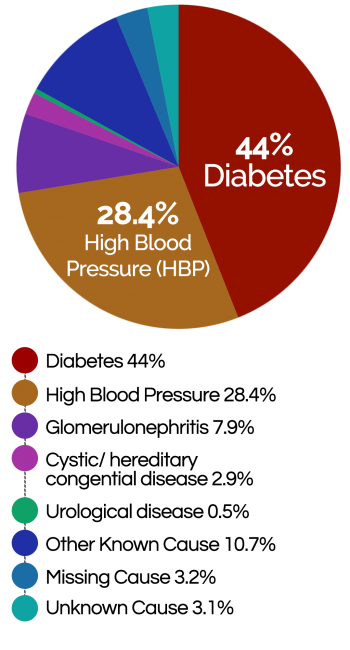Causes, Symptoms, & Treatment Options
Symptoms
When you know what to look for, you are better equipped to distinguish changes and seek treatment. Symptoms include:
- Changes in urination (frequency, color, increase or decrease in amount, foamy or bubbly consistency)
- Swelling of the feet, ankles, hands, or face
- Tiredness or weakness
- Shortness of breath
- Metallic taste or ammonia-like breath
- Back pain
- Itching
- No appetite
- Nausea and vomiting
- Increase in hypoglycemic episodes (if diabetic)
If you have experienced any of these symptoms, or have family members living with diabetes or high blood pressure, address your concerns during your next doctor’s appointment.

Here is what happens…
Once wastes build up in your blood, you feel sick. Various health problems may occur such as high blood pressure, anemia (low blood count), weak bones, poor nutritional health, and nerve damage. CKD increases your risk of having heart and blood vessel disease. Diseases that cause CKD include diabetes and high blood pressure. These complications may develop over time, but early detection and treatment can often keep chronic kidney disease from getting worse. Kidney failure may occur if CKD progresses. If this happens, dialysis or a kidney transplant is required.
Treatment Options
If you have been diagnosed with Stage V, your kidneys will need the continued support of dialysis. Dialysis is a medical treatment that removes waste and extra fluid from the blood—the procedure duplicates the job of the original kidney.
Staff Assisted Home Hemodialysis / Peritoneal Dialysis – this is performed in the privacy of the patient’s home and is administered by a licensed dialysis nurse (LVN or Registered Nurse (RN).
Self-Administered Home Hemodialysis – This procedure is performed at home by the patient and requires professional assistance (caregiver, spouse, etc.). A training period of approximately 6-12 weeks is required. This training can take place in the comfort of your home or an outpatient ESRD facility. Self-dialysis will provide the flexibility to work and/or participate in activities that best suit you and your loved ones. Upon successful completion, self-administered trained patients will be provided with 24-hour support.
In-Center Hemodialysis – This is performed at an outpatient medical facility. The dialysis treatments are performed by dialysis technicians, licensed vocational nurses, and registered nurses at the dialysis facility. The procedure can last from 3 to 4 hours, three times per week, or as indicated by your doctor.
Home Training – Both modalities (hemodialysis or peritoneal dialysis) are traditionally provided at an outpatient dialysis facility by an experienced registered nurse. Hemodialysis training lasts approximately 6-12 weeks, and the peritoneal dialysis training period is approximately 4-10 days. Upon successful completion of your training, you will perform your own dialysis at home. Nursing staff assistance would be available to assist you as necessary.
Peritoneal Dialysis – This is a life-sustaining procedure that involves the introduction and drainage of a special fluid into the abdominal cavity. The process removes waste products and excess fluid from the body. A training period of 4-10 days is required to learn this procedure, which can be taught in the comfort of your home by a registered nurse specializing in peritoneal dialysis.
